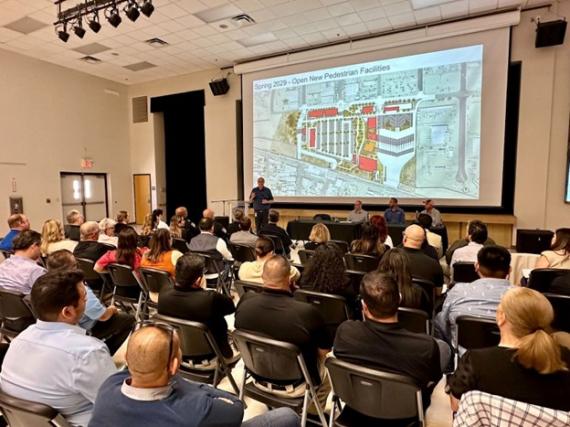GSA hosts community stakeholder engagement meetings for LPOE projects in Calexico and San Luis
By: Javier Fernandez

Last week, representatives from the U.S. General Services Administration’s (GSA) Pacific Rim Region met with local and regional stakeholders at the Calexico City Library to discuss the recently completed Phase 2A of the Calexico West Land Port of Entry’s (LPOE) $191 million modernization and expansion project. This latest construction phase delivered a total of 16 northbound vehicle inspection lanes, five southbound vehicle inspection booths, and a new administrative building. Additionally, an expansive pre-primary vehicle inspection canopy now provides drivers and U.S. Customs and Border Protection (CBP) officers with 349,847 gross square feet of much-needed shade during the region’s scorching summer temperatures.
Attendees, including representatives from the City of Calexico, the Imperial County Transportation Commission, and the California Department of Transportation, were keenly interested in learning about Phase 2B. Project Manager Vince Cagliardo explained that the Bipartisan Infrastructure Law (BIL) and Inflation Reduction Act (IRA) funded construction phase will install a temporary pedestrian inspection facility on Heffernan Avenue, one block east of the existing building. The interim pedestrian building will facilitate the demolition of the 1970s-era facility and the construction of the permanent, expanded pedestrian building with 12 inspection booths.
“We’re currently procuring the design-build contract,” informed Scott Shin, Regional LPOE Program Executive for GSA Region 9. “The goal is to award the contract this summer, break ground in Summer 2025, and deliver the completed project by the end of 2028.”
Continuing their community outreach efforts, the GSA team briefed community leaders, federal and state partner agencies, and regional stakeholders in San Luis, Arizona, on GSA’s construction project. The $359 million BIL-funded modernization and expansion project would completely rebuild the 1980s facility to better meet CBP’s operational needs, expedite wait times for travelers, and accommodate projected growth in cross-border traffic for the dynamic San Luis communities on both sides of the U.S.-Mexico border. The project counts on IRA funds to reduce the port’s environmental footprint, including using low-embodied carbon concrete, underscoring the Biden-Harris Administration’s sustainability agenda.
“The extensive use of energy-efficient building systems and fixtures, along with solar panels, will allow San Luis I LPOE to be the nation’s first Net-Zero Energy port of entry! This means that the port will be able to generate enough clean, renewable energy to meet its electricity needs - even at night, thanks to a large battery storage system,” proudly announced Chris Van Deusen, Project Manager.
Presenting to a group of about 50 attendees gathered at the Cesar Chavez Cultural Center, the project team proudly projected photos, illustrating significant progress since breaking ground in June 2023. Aerial images revealed the removal of the port’s old commercial inspection facility and employee parking lot to accommodate the construction of the new 16 northbound vehicle inspection booths, canopy, and secondary vehicle inspection area. On the east side of the port, foundation work on the southbound vehicle inspection booths and southbound headhouse was also evident.
“The amazing turnout and support we’ve received from our regional partners and public stakeholders at our meetings this week indicates how important our LPOE projects are to their respective communities,” noted Anthony Kleppe, Regional LPOE Program Manager. “It also demonstrates GSA’s ongoing commitment to working with the communities we serve to allow them to maximize GSA’s capital project investment to reach their urban planning and economic development goals.”

 U.S. General Services Administration
U.S. General Services Administration